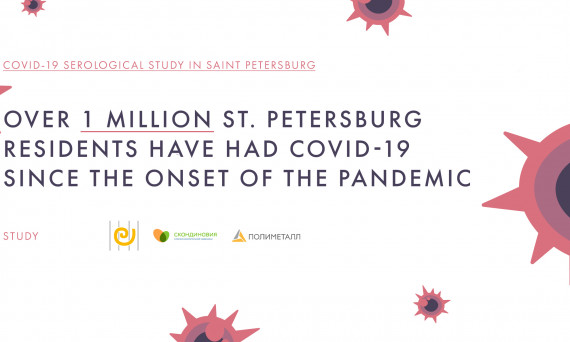At least 1 million residents of St. Petersburg have had COVID-19 since the onset of the pandemic. Most patients who had contracted the virus retained antibodies.
St. Petersburg — December 11, 2020
Researchers from the European University at St. Petersburg, Scandinavia clinic, Genetico laboratory, and Smorodintsev Research Institute of Influenza have obtained the preliminary results from the third wave of a representative SARS-CoV-2 antibody seroprevalence survey. The study is conducted with support from JSC Polymetal.
The third wave of the survey started on October 10, 2020. A two-month long monitoring of a representative sample of St. Petersburg residents uncovered some 24 % individuals with positive antibody tests. A pronounced increase in population share of positive results occurred in November. This figure approached 30 % in the last two weeks of the study (accounting for study participation bias and test quality). As a result, by the end of autumn of 2020 over 1 million residents of St. Petersburg have had COVID-19. The data are obtained using Vector-Best SARS-CoV-2-IgG-ELISA-Best.
The researchers also re-tested the participants of the first wave of the study conducted in spring and summer. Out of 95 participants with antibodies in the summer and spring waves, 92 retained antibodies according to one of the two tests used (Vector-Best SARS-CoV-2-IgG-ELISA-Best or Abbott Architect IgG). Time elapsed between tests was 4-6 months.
Anton Barchuk, study co-author: “Alas, it would be premature to conclude that a positive test result is indicative of long-term protection. However, we were surprised to discover that almost every participant of the first stage retains antibodies. Taking into consideration the low reported number of reinfections, this is good news.”
Daniil Shirokov, study co-author: “In the near future we will estimate seroprevalence using all available tests: not only Vector-Best but Genetico Coronapass Total Ig and Abbott Architect IgG as well as tests for neutralizing antibodies.”
The results from the first and second wave of the study are available as a preprint, a non peer-reviewed scientific publication. Apart from the already reported information on seroprevalence in St. Petersburg, the paper describes the study design, methods, and seroprevalence by city district or other subgroups. Comparing the self-reported characteristics of study participants, people who smoke had lower antibody prevalence than non-smokers. This result was confirmed in this study wave.
Dmitriy Skougarevskiy, study co-author: “Our study is not the only one to observe lower seroprevalence among smokers. A population-based study in England had comparable findings. For sure, we cannot conclude that smoking is a preventive measure. First, our study design does not allow us to uncover causal relationships. Second, smokers might have more COVID-19-related complications. Finally, smoking is the primary reason for many chronic diseases from cardiovascular diseases to many types of cancer. However, this finding might help us understand the transmission mechanism of SARS-CoV-2.”
Study authors will be glad to address any questions relating to the study or offer detailed comments.
Contact:
Alla Samoletova, tel.: +7 906 258 78 77, e-mail: asamoletova@eu.spb.ru.
